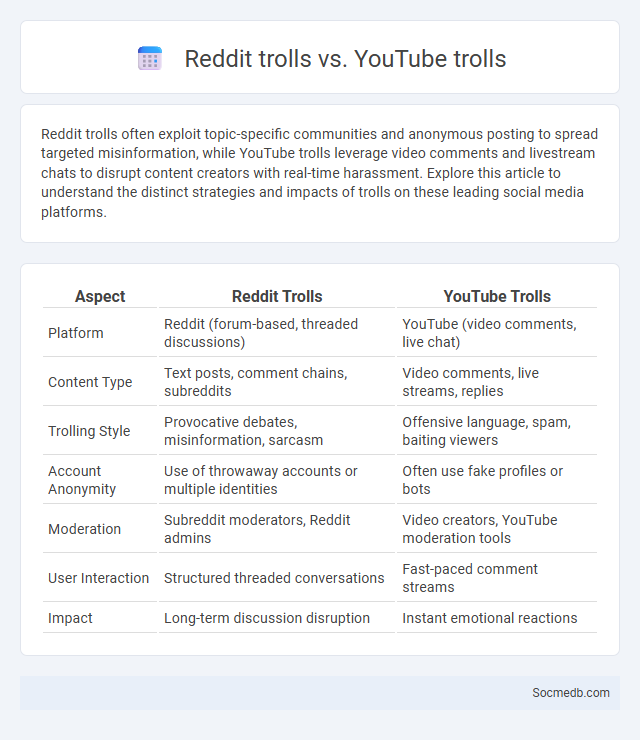
Photo illustration: Reddit Trolls vs YouTube Trolls
Reddit trolls often exploit topic-specific communities and anonymous posting to spread targeted misinformation, while YouTube trolls leverage video comments and livestream chats to disrupt content creators with real-time harassment. Explore this article to understand the distinct strategies and impacts of trolls on these leading social media platforms.
Table of Comparison
| Aspect | Reddit Trolls | YouTube Trolls |
|---|---|---|
| Platform | Reddit (forum-based, threaded discussions) | YouTube (video comments, live chat) |
| Content Type | Text posts, comment chains, subreddits | Video comments, live streams, replies |
| Trolling Style | Provocative debates, misinformation, sarcasm | Offensive language, spam, baiting viewers |
| Account Anonymity | Use of throwaway accounts or multiple identities | Often use fake profiles or bots |
| Moderation | Subreddit moderators, Reddit admins | Video creators, YouTube moderation tools |
| User Interaction | Structured threaded conversations | Fast-paced comment streams |
| Impact | Long-term discussion disruption | Instant emotional reactions |
Overview of Online Trolling
Online trolling involves deliberately posting provocative or harassing content on social media platforms to incite emotional responses or disrupt conversations. Common targets include individuals, communities, and public figures, often resulting in psychological distress and negative societal impact. Social media companies implement moderation policies and AI tools to detect and mitigate trolling behaviors, although challenges in balancing free speech and harmful content persist.
Defining Reddit Trolls
Reddit trolls are users who intentionally post inflammatory, irrelevant, or provocative content to disrupt conversations and elicit strong emotional responses. These individuals exploit Reddit's anonymity and diverse communities to spread misinformation, harass other users, or derail constructive discussions. Understanding Reddit trolls involves analyzing their behavior patterns, such as repetitive posting of offensive comments and targeting specific subreddits to maximize impact.
Understanding YouTube Trolls
YouTube trolls disrupt platform interactions by posting inflammatory, off-topic, or provocative comments to provoke emotional responses from users. These individuals often exploit anonymity and lack of immediate consequences to spread misinformation and harassment. Recognizing patterns such as repetitive negative language and targeting vulnerable creators helps in mitigating their impact and fostering a healthier online community.
Key Differences Between Reddit and YouTube Trolls
Reddit trolls leverage anonymity and threaded conversations to disrupt niche communities, often using sarcasm and inside jokes to evade moderation, while YouTube trolls exploit video comments and live chat features to spread provocative or off-topic remarks in a highly visible, linear format. Reddit's community-driven moderation and karma system limit troll impact by empowering users to downvote and report harmful content, whereas YouTube relies more on automated filters and creator-led moderation to manage trolling behavior. The distinct platform structures shape troll tactics, with Reddit encouraging subtler, context-dependent trolling, and YouTube fostering more direct, attention-seeking provocations.
Common Tactics Used by Trolls
Trolls on social media frequently use tactics such as spreading misinformation, posting inflammatory comments, and creating fake profiles to manipulate conversations and provoke emotional responses. They often target specific groups or individuals to disrupt communities and escalate conflicts. By recognizing these common tactics, you can better protect your online presence and maintain constructive interactions.
Psychological Motivation Behind Trolling
The psychological motivation behind trolling is often rooted in a desire for attention, power, or control over others in social media environments. Trolls may seek to provoke emotional reactions, asserting dominance through inflammatory or disruptive comments to fulfill personal or social needs. Understanding these motivations helps you identify and mitigate the impact of trolling on your online interactions.
Impact of Trolls on Online Communities
Trolls significantly disrupt online communities by spreading misinformation and provoking emotional responses that deteriorate constructive dialogue. Their persistent negative behavior fosters hostility, driving away genuine users and reducing overall engagement. Effective moderation strategies are essential to mitigate the harmful impact trolls have on social media platforms' health and user experience.
Platform Moderation: Reddit vs YouTube
Platform moderation on Reddit emphasizes community-driven content control through subreddit-specific rules and volunteer moderators, enabling tailored enforcement aligned with niche interests. YouTube utilizes automated algorithms combined with professional moderators to manage vast video uploads, focusing on policy compliance and protecting advertisers. Understanding these moderation approaches helps you navigate the differing content policies and user experiences on Reddit and YouTube effectively.
Strategies to Handle and Prevent Trolling
Effective strategies to handle and prevent trolling on social media include implementing robust moderation tools that detect and remove harmful content automatically. Encouraging community guidelines that promote respectful interactions and clearly outlining consequences for trolling behavior helps deter potential offenders. Educating users on digital literacy and providing resources to report abuse enhances overall platform safety and user experience.
The Future of Trolling in Digital Spaces
The future of trolling in digital spaces will be shaped by advancements in AI moderation technologies and evolving platform policies aimed at reducing harmful behavior. Emerging deepfake detection tools and real-time content filtering systems are expected to curb the spread of misinformation and toxic interactions. User education and community-driven reporting mechanisms will play critical roles in fostering safer online environments and mitigating the impact of trolling.
 socmedb.com
socmedb.com